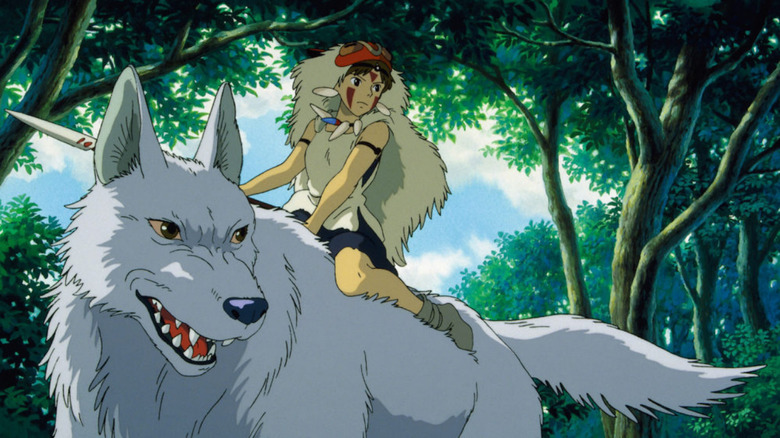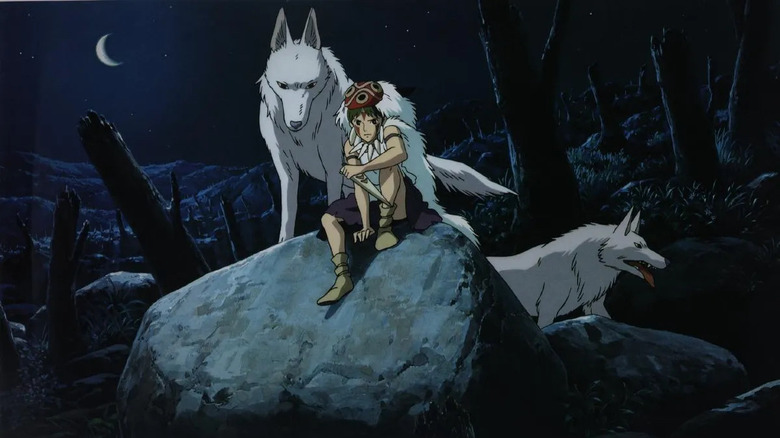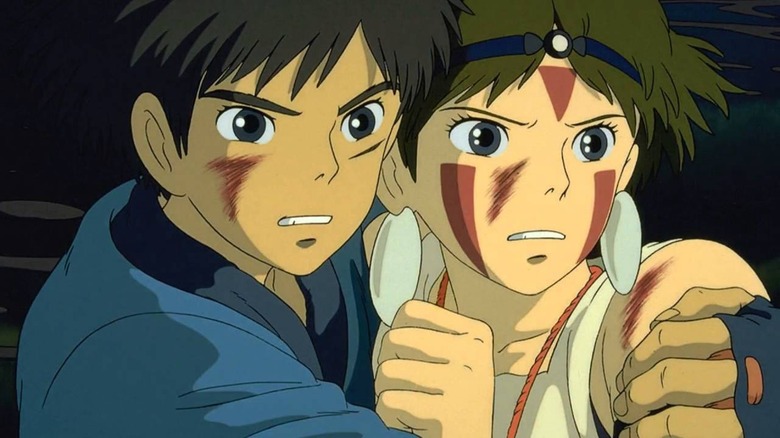How Quentin Tarantino Was Almost Involved In Princess Mononoke's Production
"Princess Mononoke" was my introduction to the singular work of Hayao Miyazaki and I can still remember the immense impact the film had on me. The 1997 Studio Ghibli movie was unapologetically dark, yet also indescribably beautiful, and marked the beginning of my inexorable pull to Miyazaki's work. "Princess Mononoke" centers on exiled prince Ashitaka as he gets caught up in the monumental struggle between nature and humankind. The film is not only gorgeously animated, but also presents a very nuanced portrait of a central conflict that has no easy resolution. It was a dark departure from the auteur's previous work, but one that seemed to invigorate him, considering the string of fantastic movies that followed.
While I love watching "Princess Mononoke" in the original Japanese, like many others, I was introduced to the movie via its English dub, which starred the likes of Claire Danes, Gillian Anderson, Billy Crudup, and Minnie Driver. Many don't necessarily consider the time, effort, and understanding needed to adapt a script into another language. There are certain cultural differences that can be quite difficult to translate and not everyone is up to the task. Interestingly, though the English script for "Princess Mononoke" was written by famed author Neil Gaiman, the studio's first choice for the job was actually Quentin Tarantino.
Finding new words
Though Disney was in charge of distributing Studio Ghibli's films in the U.S., a PG-13 epic about war and environmentalism that was more than two hours long wasn't what you might call on brand for the Mouse House. So, Disney chose to release the movie through its Miramax label, which was run by Harvey Weinstein. The now-disgraced movie mogul had a nickname back then: Harvey Scissorhands. So-named due to his penchant for drastically cutting up films in his care, Miyazaki told The Guardian that Studio Ghibli producer Toshio Suzuki actually sent Weinstein a samurai sword with the words "No cuts" on its blade. So, there were definitely concerns about the way the movie would be treated for its U.S. release.
According to Independent, after Disney handed "Princess Mononoke" over to Miramax for its English dub, Weinstein called Quentin Tarantino to write the English script — his earlier films had been distributed by Miramax, so he had a relationship with the company. Tarantino turned down the offer, but did suggest Neil Gaiman for the job. The "Sandman" scribe does seem a far more natural fit for the movie than the "Once Upon a Time in Hollywood" director. After all, Gaiman's magnum opus remains one of comics' most celebrated works and his entire oeuvre of novels, both graphic and otherwise, have a much more similar feel to the work of Studio Ghibli than Tarantino's filmography.
Making sure nothing is lost in translation
Gaiman had his work cut out for him in terms of adapting Miyazaki's script for an American audience. Although the author immersed himself in both Miyazaki's work and Japanese folk tales, Gaiman told The Baltimore Sun that the "flap count" was a major issue. This is making sure the dub matches the movements of the characters' mouths, so there was far more to worry about than finding word equivalents, though that task is daunting enough on its own. Gaiman explained that voice director Jack Fletcher was a huge help with this issue, though the author still had particular trouble with the movie's two songs. He explained:
"I've said, and not entirely in jest, that I probably spent as much time translating the two songs in 'Mononoke' as I did on the entire third draft of the script. You're translating them with a set of problems that you really don't have in the script."
Aside from that, Gaiman had different instructions from Studio Ghibli and Miramax, in terms of what he should or should not alter. Steve Alpert, head of the animation company's international division, wrote in his memoir (via Polygon):
"One problem we hadn't anticipated was that Disney would use the translations to "correct" perceived problems with the films themselves. To Disney, translation meant an opportunity to change all of the things that they didn't think would appeal to a commercial audience in America. They filled silences with dialogue that wasn't in the original script. They added plot points to fill out storylines they found unclear. They changed names to make them sound more American. And they made the kind of translation mistakes that review by a native speaker would have corrected."
This led to heated debate between the two companies (and their lawyers), which eventually gave way to a different translation process, the guidelines of which would be made contractual. "Princess Mononoke" was the first Studio Ghibli movie to be made using these new guidelines, but the process was not seamless. There was the matter of artistic integrity versus what was going to make the film appeal more to a wider audience. From the way Disney handled Studio Ghibli films while it was distributing them, it's kind of clear they never completely understood what makes them so incredible.
All in all, everyone seemed quite happy with Gaiman's diligent efforts and the author, for his part, was determined to protect Miyazaki's work. His translation is considered one of the better English adaptations of the filmmaker's scripts. While Gaiman definitely seems a more sensible choice than Tarantino, I can't help but be curious about the ways the latter's script would've been different — though I can't imagine it would have been better.


